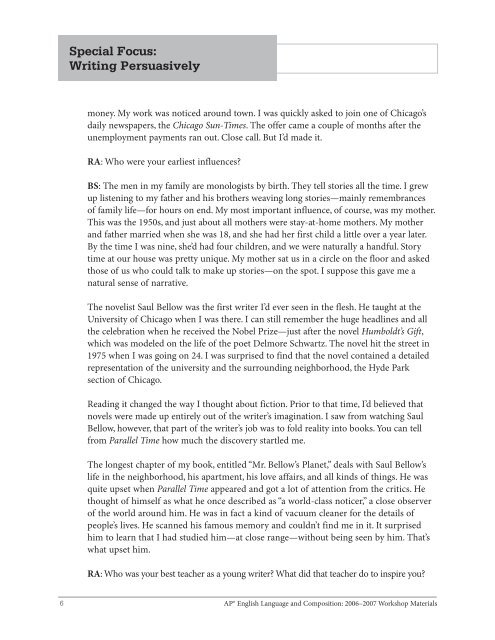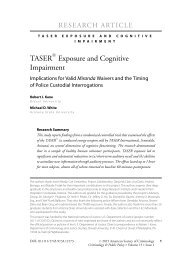1qaSADJ
1qaSADJ
1qaSADJ
You also want an ePaper? Increase the reach of your titles
YUMPU automatically turns print PDFs into web optimized ePapers that Google loves.
Special Focus:<br />
Writing Persuasively<br />
money. My work was noticed around town. I was quickly asked to join one of Chicago’s<br />
daily newspapers, the Chicago Sun-Times. The offer came a couple of months after the<br />
unemployment payments ran out. Close call. But I’d made it.<br />
RA: Who were your earliest influences?<br />
BS: The men in my family are monologists by birth. They tell stories all the time. I grew<br />
up listening to my father and his brothers weaving long stories—mainly remembrances<br />
of family life—for hours on end. My most important influence, of course, was my mother.<br />
This was the 1950s, and just about all mothers were stay-at-home mothers. My mother<br />
and father married when she was 18, and she had her first child a little over a year later.<br />
By the time I was nine, she’d had four children, and we were naturally a handful. Story<br />
time at our house was pretty unique. My mother sat us in a circle on the floor and asked<br />
those of us who could talk to make up stories—on the spot. I suppose this gave me a<br />
natural sense of narrative.<br />
The novelist Saul Bellow was the first writer I’d ever seen in the flesh. He taught at the<br />
University of Chicago when I was there. I can still remember the huge headlines and all<br />
the celebration when he received the Nobel Prize—just after the novel Humboldt’s Gift,<br />
which was modeled on the life of the poet Delmore Schwartz. The novel hit the street in<br />
1975 when I was going on 24. I was surprised to find that the novel contained a detailed<br />
representation of the university and the surrounding neighborhood, the Hyde Park<br />
section of Chicago.<br />
Reading it changed the way I thought about fiction. Prior to that time, I’d believed that<br />
novels were made up entirely out of the writer’s imagination. I saw from watching Saul<br />
Bellow, however, that part of the writer’s job was to fold reality into books. You can tell<br />
from Parallel Time how much the discovery startled me.<br />
The longest chapter of my book, entitled “Mr. Bellow’s Planet,” deals with Saul Bellow’s<br />
life in the neighborhood, his apartment, his love affairs, and all kinds of things. He was<br />
quite upset when Parallel Time appeared and got a lot of attention from the critics. He<br />
thought of himself as what he once described as “a world-class noticer,” a close observer<br />
of the world around him. He was in fact a kind of vacuum cleaner for the details of<br />
people’s lives. He scanned his famous memory and couldn’t find me in it. It surprised<br />
him to learn that I had studied him—at close range—without being seen by him. That’s<br />
what upset him.<br />
RA: Who was your best teacher as a young writer? What did that teacher do to inspire you?<br />
<br />
AP® English Language and Composition: 2006–2007 Workshop Materials



